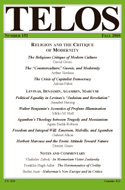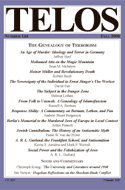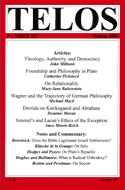By Katherine McGinity · Tuesday, October 9, 2012 As an occasional feature on TELOSscope, we highlight a past Telos article whose critical insights continue to illuminate our thinking and challenge our assumptions. Today, Katherine McGinity looks at Dimitri Ginev’s “The Erotic Attitude Toward Nature and Cognitive Existentialism” from Telos 152 (Fall 2010).
 Dimitri Ginev’s “The Erotic Attitude Toward Nature and Cognitive Existentialism” seeks to uncover ways in which Herbert Marcuse’s call for a “new science” could be achieved in current scientific research. Marcuse’s ideas are committed to an “erotic” attitude toward nature that moves away from the technological rationality that drives scientific research. Marcuse posits that engaging in an erotic attitude toward nature would allow natural entities to “be what they are” and reveal their inherent aesthetic qualities. According to Marcuse, this dramatic shift in scientific research would change essentialist thinking about science and its norms of objectivity. Ginev shares Marcuse’s feeling that current scientific research methods are problematic in their reductive approach to nature as something that can be controlled and manipulated. However, Ginev points out that attempting to dismantle the subjective-objective structure of modern science proves difficult based solely in Marcuse’s outline. Dimitri Ginev’s “The Erotic Attitude Toward Nature and Cognitive Existentialism” seeks to uncover ways in which Herbert Marcuse’s call for a “new science” could be achieved in current scientific research. Marcuse’s ideas are committed to an “erotic” attitude toward nature that moves away from the technological rationality that drives scientific research. Marcuse posits that engaging in an erotic attitude toward nature would allow natural entities to “be what they are” and reveal their inherent aesthetic qualities. According to Marcuse, this dramatic shift in scientific research would change essentialist thinking about science and its norms of objectivity. Ginev shares Marcuse’s feeling that current scientific research methods are problematic in their reductive approach to nature as something that can be controlled and manipulated. However, Ginev points out that attempting to dismantle the subjective-objective structure of modern science proves difficult based solely in Marcuse’s outline.
Continue reading →
By Katherine McGinity · Wednesday, June 20, 2012 As an occasional feature on TELOSscope, we highlight a past Telos article whose critical insights continue to illuminate our thinking and challenge our assumptions. Today, Katherine McGinity looks at Jim Vernon’s “American Antigone: Hegelian Reflections on the Sheehan-Bush Conflict,” from Telos 144 (Fall 2008).
 With the departure of the last American troops from Iraq, we can shift our perspective on the war from current event to one of history. Jim Vernon’s 2008 article “American Antigone: Hegelian Reflections on the Sheehan-Bush Conflict” was written in the midst of the war and just as Cindy Sheehan was moving herself out of the public eye. Now is an interesting time to revisit the dramatic conflict that ensued between Sheehan and George W. Bush and the ideological camps that formed around them. With the departure of the last American troops from Iraq, we can shift our perspective on the war from current event to one of history. Jim Vernon’s 2008 article “American Antigone: Hegelian Reflections on the Sheehan-Bush Conflict” was written in the midst of the war and just as Cindy Sheehan was moving herself out of the public eye. Now is an interesting time to revisit the dramatic conflict that ensued between Sheehan and George W. Bush and the ideological camps that formed around them.
Continue reading →
By Katherine McGinity · Thursday, February 9, 2012 As an occasional feature on TELOSscope, we highlight a past Telos article whose critical insights continue to illuminate our thinking and challenge our assumptions. Today, Katherine McGinity looks at Michael Mack’s “Richard Wagner and the Trajectory of Transcendental Philosophy,” from Telos 123 (Spring 2002).
 Michael Mack’s “Richard Wagner and the Trajectory of Transcendental Philosophy” explores the differing brands of anti-Semitism in Kant, Hegel, Feuerbach, and Schopenhauer, and explains how their scrutiny of Jews as a hindrance to society was radicalized by Richard Wagner. Mack details how each philosopher’s particular form of anti-Semitism fed into Wagner’s social-political writings as well as his “total works of art.” By investigating the concepts put forth by Wagner’s philosophical predecessors, one can more fully understand how a radicalized version of Kantian moral philosophy infiltrated German national culture through the composer’s art. Mack specifically addresses how these ideas manifested in Wagner’s Ring Cycle. Michael Mack’s “Richard Wagner and the Trajectory of Transcendental Philosophy” explores the differing brands of anti-Semitism in Kant, Hegel, Feuerbach, and Schopenhauer, and explains how their scrutiny of Jews as a hindrance to society was radicalized by Richard Wagner. Mack details how each philosopher’s particular form of anti-Semitism fed into Wagner’s social-political writings as well as his “total works of art.” By investigating the concepts put forth by Wagner’s philosophical predecessors, one can more fully understand how a radicalized version of Kantian moral philosophy infiltrated German national culture through the composer’s art. Mack specifically addresses how these ideas manifested in Wagner’s Ring Cycle.
Continue reading →
|
|
 Dimitri Ginev’s “The Erotic Attitude Toward Nature and Cognitive Existentialism” seeks to uncover ways in which Herbert Marcuse’s call for a “new science” could be achieved in current scientific research. Marcuse’s ideas are committed to an “erotic” attitude toward nature that moves away from the technological rationality that drives scientific research. Marcuse posits that engaging in an erotic attitude toward nature would allow natural entities to “be what they are” and reveal their inherent aesthetic qualities. According to Marcuse, this dramatic shift in scientific research would change essentialist thinking about science and its norms of objectivity. Ginev shares Marcuse’s feeling that current scientific research methods are problematic in their reductive approach to nature as something that can be controlled and manipulated. However, Ginev points out that attempting to dismantle the subjective-objective structure of modern science proves difficult based solely in Marcuse’s outline.
Dimitri Ginev’s “The Erotic Attitude Toward Nature and Cognitive Existentialism” seeks to uncover ways in which Herbert Marcuse’s call for a “new science” could be achieved in current scientific research. Marcuse’s ideas are committed to an “erotic” attitude toward nature that moves away from the technological rationality that drives scientific research. Marcuse posits that engaging in an erotic attitude toward nature would allow natural entities to “be what they are” and reveal their inherent aesthetic qualities. According to Marcuse, this dramatic shift in scientific research would change essentialist thinking about science and its norms of objectivity. Ginev shares Marcuse’s feeling that current scientific research methods are problematic in their reductive approach to nature as something that can be controlled and manipulated. However, Ginev points out that attempting to dismantle the subjective-objective structure of modern science proves difficult based solely in Marcuse’s outline.  With the departure of the last American troops from Iraq, we can shift our perspective on the war from current event to one of history. Jim Vernon’s 2008 article “American Antigone: Hegelian Reflections on the Sheehan-Bush Conflict” was written in the midst of the war and just as Cindy Sheehan was moving herself out of the public eye. Now is an interesting time to revisit the dramatic conflict that ensued between Sheehan and George W. Bush and the ideological camps that formed around them.
With the departure of the last American troops from Iraq, we can shift our perspective on the war from current event to one of history. Jim Vernon’s 2008 article “American Antigone: Hegelian Reflections on the Sheehan-Bush Conflict” was written in the midst of the war and just as Cindy Sheehan was moving herself out of the public eye. Now is an interesting time to revisit the dramatic conflict that ensued between Sheehan and George W. Bush and the ideological camps that formed around them.  Michael Mack’s “Richard Wagner and the Trajectory of Transcendental Philosophy” explores the differing brands of anti-Semitism in Kant, Hegel, Feuerbach, and Schopenhauer, and explains how their scrutiny of Jews as a hindrance to society was radicalized by Richard Wagner. Mack details how each philosopher’s particular form of anti-Semitism fed into Wagner’s social-political writings as well as his “total works of art.” By investigating the concepts put forth by Wagner’s philosophical predecessors, one can more fully understand how a radicalized version of Kantian moral philosophy infiltrated German national culture through the composer’s art. Mack specifically addresses how these ideas manifested in Wagner’s Ring Cycle.
Michael Mack’s “Richard Wagner and the Trajectory of Transcendental Philosophy” explores the differing brands of anti-Semitism in Kant, Hegel, Feuerbach, and Schopenhauer, and explains how their scrutiny of Jews as a hindrance to society was radicalized by Richard Wagner. Mack details how each philosopher’s particular form of anti-Semitism fed into Wagner’s social-political writings as well as his “total works of art.” By investigating the concepts put forth by Wagner’s philosophical predecessors, one can more fully understand how a radicalized version of Kantian moral philosophy infiltrated German national culture through the composer’s art. Mack specifically addresses how these ideas manifested in Wagner’s Ring Cycle. 

